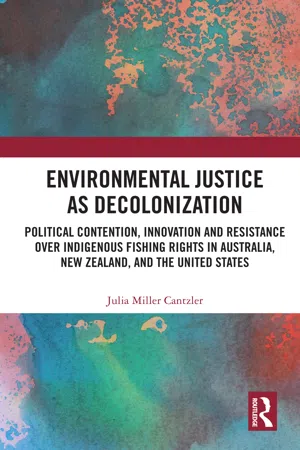
Environmental Justice as Decolonization
Political Contention, Innovation and Resistance Over Indigenous Fishing Rights in Australia, New Zealand, and the United States
- 212 pages
- English
- ePUB (mobile friendly)
- Available on iOS & Android
Environmental Justice as Decolonization
Political Contention, Innovation and Resistance Over Indigenous Fishing Rights in Australia, New Zealand, and the United States
About This Book
This book corrects the tendency in scholarly work to leave Indigenous peoples on the margins of discussions of environmental inequality by situating them as central activists in struggles to achieve environmental justice. Drawing from archival and interview data, it examines and compares the historical and contemporary processes through which Indigenous fishing rights have been negotiated in the United States, Australia and New Zealand, where three unique patterns have emerged and persist. It thus reveals the agential dynamics and the structural constraints that have resulted in varying degrees of success for Indigenous communities who are struggling to define the terms of their rights to access traditionally harvested fisheries, while also gaining economic stability through commercial fishing enterprises. Presenting rich narratives of conquest and resistance, domination and resilience, and marginalization and revitalization, the author uncovers the fundamentally cultural, political and ecological dynamics of colonization and explores the key mechanisms through which Indigenous assertions of rights to natural resources can systematically transform enduring political and cultural vestiges of colonization. A study of environmental justice as a fundamental ingredient in broader processes of decolonization, Environmental Justice as Decolonization will appeal to scholars of sociology, anthropology, environmental studies, law and Indigenous studies.
Frequently asked questions
Table of contents
- Cover
- Half Title
- Title
- Copyright
- Dedication
- Contents
- 1 Introduction
- 2 Colonization and fishing in Australia, New Zealand and the United States
- 3 State-Indigenous contention, decolonization and environmental justice
- 4 Political opportunities and obstacles: the legacies of colonization
- 5 Indigenous resources: formal structures, allies and free spaces
- 6 Indigenous innovation and action
- 7 The cultural dynamics of Indigenous claims-making
- 8 Conclusion
- Index